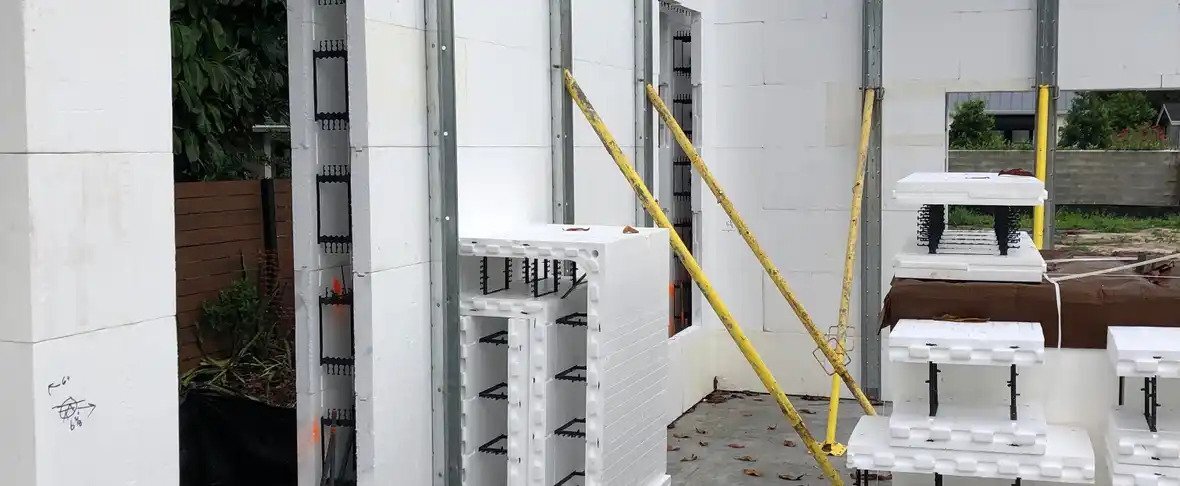
A Comprehensive Guide to the Types of Concrete Blocks Used in Construction

Concrete blocks may seem simple, but they are absolutely critical to construction projects all over the world. As widespread as concrete is today, it is far from a new building material. Dating back thousands of years, even the ancient Romans used concrete in their engineering projects.

Modern concrete blocks come in many different shapes and serve many different purposes. They provide a versatile alternative to poured concrete and allow for many structures to be built quickly and efficiently. While you may be familiar with many of them, some blocks like insulated concrete forms may surprise you with their abilities.
What Makes Concrete So Special?
The importance of concrete in construction cannot be overstated. It is estimated that the world produces more than 4.4 billion tons of concrete annually. Concrete is highly versatile and easy to make. With the ability to provide strength, durability, and versatility to any construction project, you’ll find concrete on just about any job site.
Some of the properties that make concrete so popular are:
Strength
Under compression, concrete’s strength is unparalleled. When reinforced with rebar, concrete has incredible tensile strength as well. Concrete also tends to increase in strength over time, meaning it produces buildings that are built to last.
Versatility
Concrete can be applied to many different applications, from roads to columns. The ability to shape concrete and vary the strength of the concrete mix provides endless possibilities. Concrete can also be cut into different shapes and sizes as needed.
Durability
Concrete can take a beating. Natural disasters and harsh weather conditions are not a problem for concrete. Fire and chemical exposure are also not a concern for concrete. Using concrete in construction projects helps ensure longevity and durability.
Concrete Blocks: Solid vs. Hollow

In addition to pouring concrete, many construction projects make use of concrete masonry units also known as concrete blocks. Concrete blocks serve vital roles and come in two main types, solid and hollow:
Solid Blocks
Solid concrete blocks are typically used for applications like paving walkways. Retaining walls and steps are often made from solid blocks as well. Solid blocks are very strong and heavy in addition to being simple, and inexpensive.
Common types of solid concrete blocks are:
Fly ash block
Aerated autoclaved block
Paving block
Cellular lightweight block
Expanded clay block

Hollow Blocks
Hollow blocks are used in construction projects to build fences and walls. They typically have holes that make up 25% to 50% of their cross-sectional area. The holes make the blocks significantly lighter, but still give them strength where they need it. The holes in the blocks allow electrical wiring and piping to be run through them, and rebar can also be placed in the holes to give the blocks even more strength.
Hollow concrete blocks come in many different shapes. The various shapes give the blocks special functionality depending on the application. Some common hollow blocks are:
Stretcher block
Pillar block
Lintel block
Jamb Block
Column block
Corner block
Insulated Concrete Form block
How to Choose Which Block to Use?
The versatility of concrete blocks can also make it difficult to determine which type to use. Knowing the application and the desired properties of the block help make the selection easier. Some blocks work better over doors and windows, some are lighter weight, and some are better at dampening sound. The project budget can often help determine the concrete block selection as well. Specialized blocks are generally less available and can cost more. The installation of concrete blocks does require a skilled masonry contractor.
Concrete block walls, in most applications, require additional labor and materials to become a finished wall assembly, such as strapping, insulation, vapor retardant, etc.
ICF Blocks: An Upgrade to Traditional Concrete Blocks

Concrete masonry units have been used for a long time, but one type that is growing in popularity is the Insulated Concrete Form (ICF) block. Consisting of two panels of insulation suspended together with a tie system, ICF blocks are stacked together to form walls and other structures. The lightweight foam blocks form walls that have a hollow cavity between the layers of insulation. Rebar is placed inside the hollow space and concrete is poured into the cavity and allowed to cure.

Insulated concrete forms are an upgrade from traditional concrete blocks. They consist of lightweight foam, so ICF blocks are much easier to work with and to install than heavy concrete blocks. Once the concrete sets in an ICF wall, the resulting structure is as strong as a traditional concrete block wall, but it also has both an interior and exterior layer of insulation already completed.
ICF blocks create buildings with the benefits of steel-reinforced concrete and incredible energy efficiency without the downsides and labor costs of working with heavy concrete blocks. Compared to most traditional construction methods, ICF blocks provide an exceptional level of strength, durability, and ease of use to any construction project. To learn more about ICF blocks, reach out to the concrete experts at Fox Blocks today!